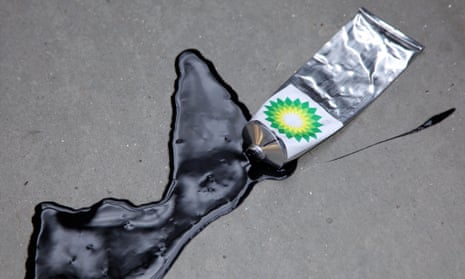A BP archive containing scientific knowledge on renewable energy projects collected over decades as a result of a multi-billion-pound research programme is still closed to the public despite promises to the contrary.
Critics said BP’s integrity was at stake and the archive held next to the Modern Records Office at Warwick University must be opened immediately.
The oil company told its shareholders at the annual general meeting last week that BP shared all the information it had held on to – unless it was particularly commercially sensitive.
Carl-Henric Svanberg, the BP chairman, was specifically asked about the store of research material kept under wraps in a corporate archive at Warwick University: “Nothing is locked away. We share everything happily.”
But a spokesman at the company’s headquarters later confirmed what the Guardian had already reported: that no material for the last 40 years was available to the public.
“The National Records Office has a 30-year rule. We just have a longer one,” explained the company spokesman, while Peter Housego, the BP archive manager at Warwick, said the opening period was under regular review with (these) internal stakeholders.
Catherine Howarth, the CEO of Share Action, who challenged BP at the AGM to open the archive as part of a wider demand to be more transparent about the issue of climate change, said she was disturbed to hear the company was apparently not opening the archive.
“I’m truly disappointed if it turns out that BP’s archive of research is not in fact open, or due to be opened imminently. The chairman not only told us about BP’s general commitment to ‘sharing our knowledge’ but explicitly responded to my question by confirming that nothing would be ‘locked away’.
“I would expect him to make good on that. Openness is very much in the public interest and a matter of integrity with those shareholders who attended the AGM and heard the Chairman’s commitment with their own ears.”
Doug Parr, chief scientist at Greenpeace, said: “It looks as if burying decades’ worth of energy research is too embarrassing a policy for BP’s boss to defend, even in front of his own shareholders.
“Fossil fuel giants already have a humongous credibility gap to fill when it comes to climate and clean energy. Making a mockery of transparency in this way will only make it bigger.”
BP now spends almost all its $20bn (£13bn) per annum capital expenditure on oil and gas, but in the 1980s and early 1990s it spent large amounts of cash building wave power prototypes and researching energy efficiency products.
At one stage, under the then chief executive, John - now Lord - Browne, BP promised to go “beyond petroleum” but the strategy was ditched and the company reverted to focussing on fossil fuels.
Students at Warwick University, who have already seen 100 staff call for the academic authorities to withdraw their pension fund from all fossil fuel companies, said they were taking the issue up with the local BP archive staff.
“We are pressuring them to explain the contradictions apparent from the chairman’s statement and will continue to pressure them as much as possible to open up their files,” said Alex Clark from Fossil Free Warwick University.
BP insists that even if access was given to the public there would be little of major interest except much history about oil and gas operations.
But senior researchers who used to be employed by the company have privately said the archive could document the huge amount of work done by BP on all sorts of issues, such as climate change and renewable energy technology including solar and wave power.





Comments (…)
Sign in or create your Guardian account to join the discussion